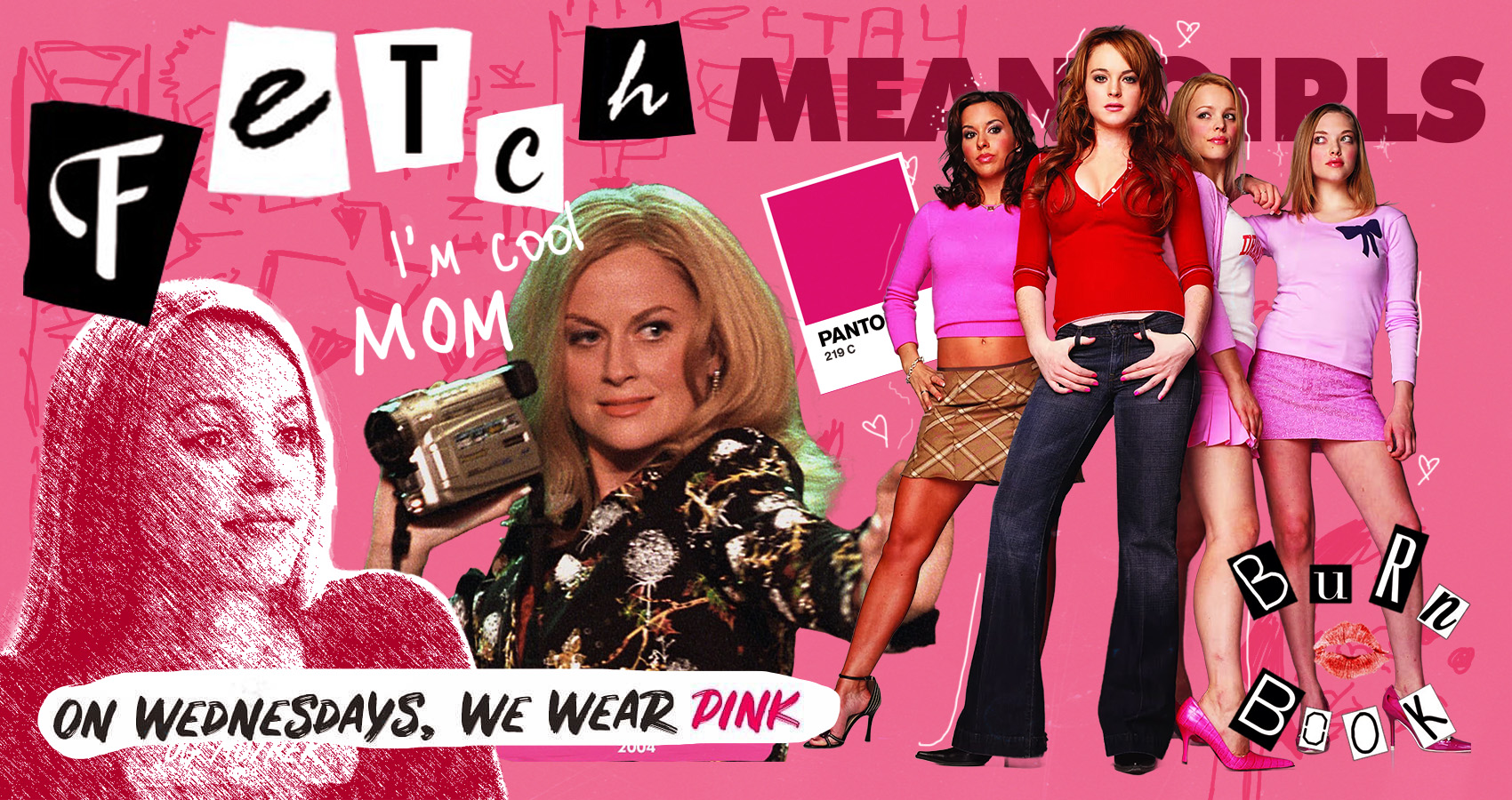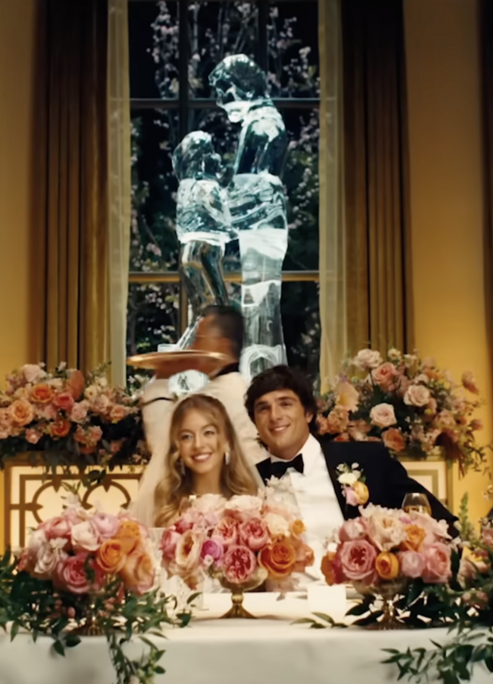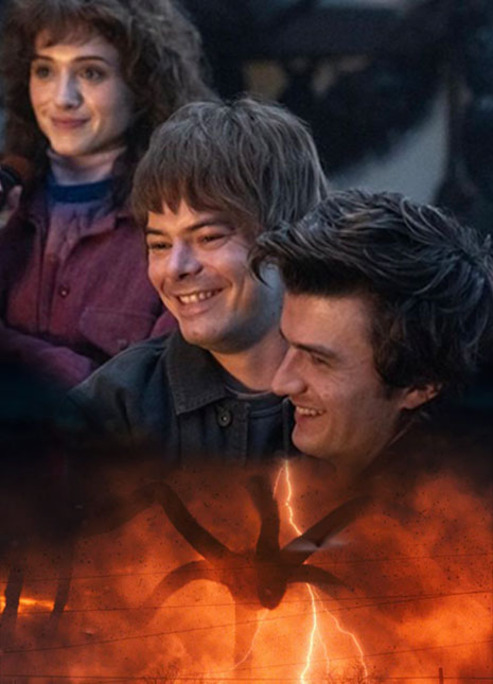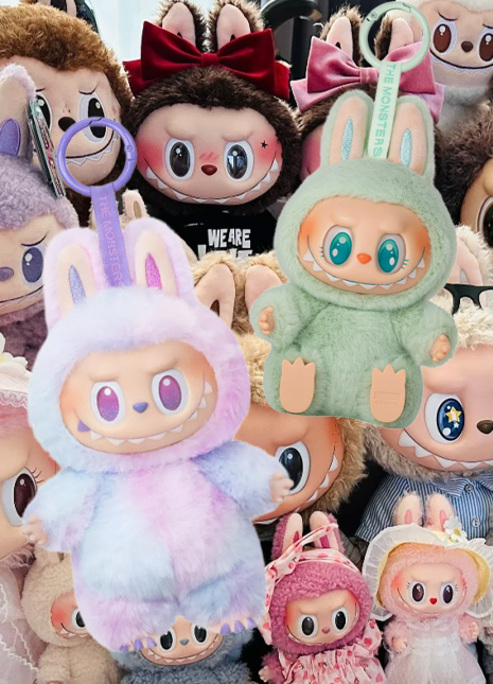
20 Years of Mean Girls: A Lasting Pop Culture Phenomenon
You blinked and FIZZY went back to 2004.
For Zoë London, engineering student, musician, and founder of the beauty, wellness, mental health, and style community Pauvre Oison, despite being a girl-centric film, the production has '' become a feminist movie in more recent years with the sort of reclamation of Mean Girls status that we’re seeing with bimbocore and girl blogging and all that.''
With communities centered around hyper-pop culture, feminine aesthetics reminiscent of the style of the film and its main characters, and old images from the 2000s, the production holds resonance to this day. As London sees it, Mean Girls has had a positive effect on a lot of girls and young women by providing a popular piece of media that mocks some attitudes while making us reflect about them. ''It passes the Bechdel test with flying colors,” she states.
However, London believes that Mean Girls has also suffered many misinterpretations. According to the creator, the perpetuation of harmful stereotypes against girls has intensified. In this context, she references the 2006 song "Stupid Girls" by singer Pink. Describing it as an example of the "Y2K girly culture," London recalls that the song presents the idea that ''you can't be girly, have friends, or have agency over your own sexuality and still be intelligent and high achieving.''
''It's like a Janice Ian anthem,’’ she declares. On a personal note, London mentions the time she dyed her hair blonde for her teenage modeling career. ‘‘I was a total dork at school, I got really good grades, I was definitely known for being a nerdy gender ambiguously presenting weirdo.’’ But that changed when she switched schools.
When she answered teachers' questions, she faced hostile comments like, ''That was a really blonde comment,'' and frequently had to prove to them that she hadn't cheated on tests she'd done extremely well on. Her schoolmates also referred to her as a kind of Regina George.
''I was hustling to get into engineering at university, I ran a film club with one of my friends, I was openly queer and had a girlfriend, then a boyfriend, then a girlfriend; I wore a suit to my prom! It was literally just because I was blonde and pretty and therefore people just decided that I was a Mean Girl. Taking a break from modeling, London quickly dyed her hair brown again.
Despite the obstacles and stereotypes, she sees the movie's overall impact as positive. “It is still a great movie, and there’s so many ways it’s completely influenced pop culture and girl blogger culture. I do think that if it were made today, there would probably be a much deeper dive into demonstrating that all of the characters were multifaceted people.”
And when it comes to any character in Mean Girls, the one who never seems to leave people's minds is Regina George. ''Does Regina George haunt me every day? She does have that quality,'' Rachel McAdams told the New York Times.
Apparently, the Queen bee doesn't have the power to haunt only Addams to this day. For Nicole Russin-McFarland, film score composer and actress with work released under a division of Sony Music called AWAL, the character she most relates to is Regina. ''I have people trying to bring me down like they try to her in the movie,'' Russin-McFarland explains.
The movie came out just before she turned 17, and the film composer remembers it playing on all the TVs in the video rental stores and how funny it seemed – so she rented it immediately.
But as a teenager who switched in-person high school to online classes at fifteen, Russin-McFarland was not really interested in the real high school dynamics. Homeschooled? Does this look familiar?
While she states that real high school looked boring and weird to her, she was the same age of the characters. And as teenagers, we always have people behind our backs – especially when you are a girl. But then, no one said mean girls would disappear after high school.
''I was for years scrubbing the web of fake articles and commentary about my real name and any pen names I’ve ever used,'' Russin-McFarland shares. In the public eye, the perspective grew. ''It was really easy to say something was true in the American blogging and media world. Every young woman dealt with it. Britney (Spears) and Lindsay (Lohan) had it worse, but it trickled down to everyone,'' the film composer tells FIZZY.
But that hasn't changed much in the social media age. As Russin-McFarland observes, sensationalized journalism has now migrated to social media, where individuals feel comfortable offending others. She characterizes the Internet as a "real-life Burn Book."
One of the things she mentions is how creepy it was to read what men were writing about 17-year-old Lindsay Lohan and her body. ''I thought it would be exclusive to her because she was an A-list actress,'' Nicole reflects. But in reality, all women were dealing with this kind of issue, be it from mean comments to everyday gossip. And now, with the emergence of content creators, influencers and online exposure, this is only increasing.
While technological progress has brought disadvantages such as the emergence of cyberbullying, it has also given rise to online support communities that have come to help, or at least mitigate all the chaos.
Examples include ''We All Grow Latina,'' aimed at Latina writers, and ''Girlboss,'' which explores conversations between women about their work, money, and life. It's undeniable that mean people still exist. They're everywhere. But the world can be good, too. And seeing more and more groups of girls and women lifting each other gives one hope for more strength.
If there's one thing Mean Girls shows, it's that. Beyond the girl-centric aspect, the movie is considered to have done a lot for representation. ''It nails diversity from real life really nicely for 2004 standards when that was rare, without ruining the storytelling in the process,'' states Russin-McFarland.
As an example, the composer cites a fan theory that Regina George is bisexual, based on her treatment of Cady and other girls. ''I love that because it means that Regina does not have to fit silly stereotypes about LGBTQ+ women being all masculine ladies who live at Home Depot,'' she shares.
Viewing it as a breakthrough production because before and during the 2000s, there were no LGBTQ+ characters without being terribly stereotyped, Russin-McFarland believes the film shows that LGBTQ+ women can be beautiful ''Barbie doll'' women like Regina. In representative matters, the film score composer mentions Janis' ethnicity as Lebanese-American, dating the mathlete Kevin, who is presumably Indian-American.
''It is done so naturally. Whereas in 2024, we still have problems with films and shows doing little for character development because a character’s race or sexual orientation is the plot,'' Nicole declares.
With a natural approach to relevant matters of representation, feminine competition, stereotypes and the way the world so often pits women against women, with the plus of a raw relatability and savvy jokes, the plot written by Fey is what makes Mean Girls more than great.
''I didn’t know how good it was going to be,'' actress Amanda Seyfried, who played Karen as her first role, told Interview Magazine in 2022 during a conversation with Lindsay Lohan, commenting on how much fun the cast had. ''I had a feeling, just because you don’t always have that much fun making movies and I knew it was going to show through. But I never realized what it would be, still today,'' Lohan replied. Today, it still is.
Haydyn Hallmark, a college student in Washington State and a die-hard Mean Girls fan, remembers her first time seeing the ''pink chaos'' when she was nine or ten years old. ''This movie oozes iconic,'' she begins. From the first minute to the last, we are all drawn in. ''It all sticks to you; the quotes, the fashion, the real-world themes and motifs.
With all of the hilarity, you almost forget what Cady was fighting over. Maybe there’s a realization that you too have been swept up into the game, enjoying the disdain a little too much,'' she continues.
Whether it be jealousy, shame, fury, passion, trust, or disappointment, we see ourselves in every emotion portrayed on the Mean Girls’ screen. At least that is how Hallmark feels. When asked about finding resonance with any character, she shares that "the easy answer would be all of them in their own ways.''
To name a few: Karen's supportiveness, innocence, and compassion – do you want to do something fun? Do you want to go to Taco Bell? – Regina's bravado and pride, Cady's determination, Janis' stand-up-for-herself attitude, Damian's loyalty, and Gretchen's insecurity and desire to fit in. But for Hallmark, the character she relates to the most is Gretchen Wieners for being ''such a good friend.''
While the character portrayed by Lacey Chabert is full of secrets and displays a certain vanity, she always stands by her friends – whether it's covering up their infidelities, not wearing hoop earrings because they've been told not to, or dropping gems like, ''Ex-boyfriends are just off-limits to friends. I mean, that's like the rules of feminism.''
Although the previous quote remains iconic to this day, others do as well. Hallmark mentions Regina George's "And I guess she's on crack now" when discussing Janis with Cady. ''While it’s off-putting there’s a certain dry, unexplainable humor. A good way to end a sentence with your girlfriends to make sure there’s a solid laugh,'' the fan points out. While there are sentences that make one burst out laughing, there are others that enter the personal vocabulary of some.
For Russin-McFarland, that sentence is the memorable ‘‘Get in loser. We’re going shopping.’’ According to the film's composer, she says it ''all the time to people when we go shopping.'' In the mall, where the four girls see Gretchen’s situationship Jason with another girl leading Regina to call her house pretending to be ''Susan from Planned Parenthood,'' there is also room for other activities: wardrobe renovation and fashion sprees. And in sartorial terms, one can’t forget Mean Girls’ impact in fashion.
The Y2K craze is nothing new: it has become common to see TikTok users recreating the looks of Lindsay Lohan and other 2000s It Girls, bringing the millennial style wave along with many controversies – and rightly so –, and some netizens being guided by The Plastics rules, such as pink on Wednesday – although Greta Gerwig's Barbie may have been partly responsible for that. When the streets are filled with references from the Mean Girls era, it is worth considering the designer collections presented in runways or photoshoots.
In 2012, lingerie giant Victoria's Secret had model Barbara Palvin walking the flashy runway in a sassy Santa outfit – which was very similar to the Plastics' sultry look for the talent show where they perform Jingle Bell Rock. But the homages didn't stop there. For Redemption's 2018 couture, a party dress that resembled Cady Heron's party dress in Mean Girls when she became the new Queen Bee was chosen.
Blumarine's Spring/Summer 2022 show had a Y2K flair everyone adored. And, at Balenciaga's Pre-Fall 2024 show, velvet tracksuits – one in pink, like Regina's ''cool mom'' wore – took over Los Angeles venues. But truth be told, any pink or Y2K look that hit the runway could be part of Mean Girls' world. And that was the case with one particular accessory.
''I loved that I had the little purse in the movie where Cady Heron turns into a plastic, applying her makeup on that,'' Russin-McFarland declares. The purse is a Louis Vuitton White Multicolore LV Monogram Pochette Bag, which became a symbol from the movie but also a staple from Y2K fashion, thanks to Lindsay Lohan and costume designer Mary Jane Fort.
With a two-month research process that included going through local high school yearbooks, observing what students from different groups were wearing, and looking to symbolic Y2K figures like Paris Hilton to give the Plastics look life, Fort shared in an interview with Business Insider in 2023 that her focus was to start with what was real.
Mixing the cozy reality with the glamour that could only be seen in paparazzi shots of Hilton, for example, Fort took the flashy style even further, making everyone want to dress like Regina George and her gang. By forever changing the way teenagers dressed and starting an entire movement with "On Wednesdays, we wear pink" – along with Fey, of course – Fort made Mean Girls not only a cinematic phenomenon, but a fashion one as well, with teens running after miniskirts, velvet outerwear, tight tops and fetch accessories.
At least that's what content creator Zoë London thought when she first watched it at a sleepover when she was eight. "At the time, I was just in awe of the outfits," she says.
Beyond the costume design, there were other things that touched the audience too. Themes such as relatability and identification have already been discussed. But the lessons presented in the movie are also up for debate. Talking behind people's backs is not cool. Concealing what we're good at is stupid. And to receive respect, one must give respect. These lessons, not to mention the glorious nostalgia, are a significant element in maintaining the movie's cult status, impacting us to this day.
When asked if any movie can or has touched audiences the way Fey and Waters' production did, pop culture expert George Patient points to films like Amy Heckerling's Clueless, John Hughes' The Breakfast Club and Michael Lehmann's Heathers, which have also made a profound impact by addressing teen life and dynamics. But for Hallmark, no film should elicit a similar response from its audience the same way Mean Girls did, because it ''came out exactly when it was supposed to,'' reflecting the times. The college student defines the timing as perfect, adding that ''the energy was raw in a way that would be too artificial to recreate now.''
But for London, the HBO series Euphoria "encapsulates the youth experience these days the same way that Mean Girls did for teens in the early 2000s." While the creator says that Sam Levinson's show, based on photos by Petra Collins, is not a comedy, she believes that its cultural impact was close to what Mean Girls did.
This is evidenced by the popularity of the show's soundtrack, the Halloween season filled with Maddies, Cassies, Rues, Kats, and Jules, makeup recreations, and Tik Tok sounds with iconic lines like ''Bitch, you better be joking,'' ''Wait, is this fucking play about us?'' and ''I want to be as beautiful as the ocean'' – not to mention the incessant craving for the next season online.
While there are films and series that show the teenage years like the ones mentioned above, there are also some that represent social traits and defy them. ‘’Legally Blonde inspired lots of women who didn’t fit into the stuffy lawyer stereotype to go to law school,’’ Russin-McFarland states. Arguing that many influence us – in much the same way that Mean Girls did, though in different ways – she also mentions Greta Gerwig's acclaimed ''Barbie.''
The director, known for female-focused films like ''Lady Bird'' and ''Little Women,'' defined Barbie, which took over the summer of 2023, as ''certainly a feminist film.'' Not only was Gerwig's production a hit among critics and audiences alike, but it also inverted gender stereotypes and challenged the male gaze - "Barbie has a great day every day, but Ken only has a great day when Barbie looks at him," reads Helen Mirren's lines.
By showing that in Barbie land, Barbies – i.e. women – can be everything they want to be, the film became an emblem of female empowerment. ''The Barbie movie shows women that you can do anything well without sacrificing your womanhood, like how the Barbies in the movie are the president, Nobel prize winners, astronauts and everyone you dream of being,'' Russin-McFarland shares.
‘‘You can go on and on, movies change the world,’’ she finishes. Change, they did. For Zoë London, not only boosted discussions surrounding the competitive dynamics between girls and women, the intellectual underestimation many women experience, and the social pressures of adolescence but also of adulthood in forming bonds, but also caused ‘‘a much bigger push toward sisterhood and girls uplifting girls.’’ In a way, the movie closes with a blatant illustration of female solidarity too.
By the end of the movie, each character is in their own group of interest, be it athletic, academic, cultural, or just connected by pure chance. Despite their differences, they all greet each other with glances, smiles, and nods – and even a new Plastic-like trio appears not creating any confusion – as a consensus that all is in the right place and that there is respect between them all.











